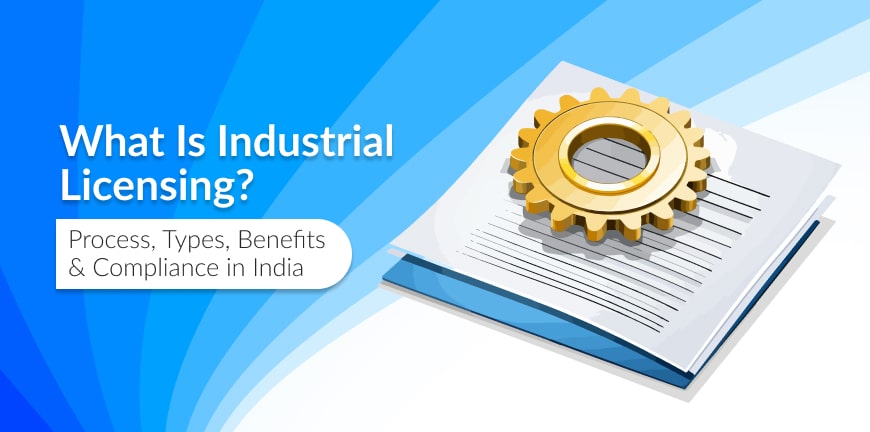
What are HR Shared Services? Definition, Benefits, Functions, Steps
23/05/2025
How We can Help Japanese Companies Find Qualified Bilingual Talent in India?
27/05/2025- What is Industrial Licensing?
- Why Is Industrial Licensing Important?
- What are the Types of Industrial Licenses?
- What is the Process of Industrial Licensing in India?
- What are the Documents Required for Industrial Licensing?
- Difference Between Industrial License and Factory License
- What are the Penalties for Non-Compliance?
- Are You Looking Compliance partner?
- Frequently Asked Questions (FAQs)
Are you planning to open a manufacturing plant to produce defence-related products or industrial explosives for ethical use? Then you require an industrial license to run operations within India. Let’s discuss everything about industrial licensing to help the related companies make informed decisions and increase their chances of getting an industrial license.
What is Industrial Licensing?
Industrial licensing is a mandatory requirement for any organisation to establish and operate certain industry types in India under the IDR Act or the Industries (Development and Regulation) Act, 1951. The Secretariat of Industrial Assistance (SIA) approves industrial licensing only after the nod from the licensing committee.
Industrial licensing meaning indicates that any company that comes under the purview of the IDR Act must possess an industrial license and must showcase it to the relevant authorities on demand without fail. Any licensed industrial undertaking is not permitted to manufacture a new product or component until the license is renewed or the government allows it to manufacture under the same license.
Why Is Industrial Licensing Important?
Here are the major reasons that highlight the importance of industrial licensing:
1. Compliance and Regulation
Based on the industrial licensing policy definition, it is clear that any company that holds an industrial license under the IDR Act must align their manufacturing and delivery procedures with the regulations and guidelines specified under the act without fail.
2. Public Safety
Certain industries that use tobacco, alcohol, explosives, and harmful chemicals in their manufacturing must have an active industrial license to ensure public health and safety.
3. Accelerate Regional Development
One of the primary industrial licensing policy objectives is encouraging and accelerating industrial development in backward areas to create a balanced industrial ecosystem across India.
4. Protection of Small-Scale Sector
The most positive impact of the industrial licensing policy will be on the small sector industry, as manufacturing of certain items can be restricted only to these industries, allowing them to grow their market reach.
5. Preventing Monopolies
Industrial licensing can limit the economic power of large industrial houses, allowing upcoming industries to get fair opportunities to accelerate their growth.
What are the Types of Industrial Licenses?
The IDR Act has created a rule that industries interested in manufacturing a certain list of items must obtain an industrial license to operate in India. The items listed under the industrial licensing definition include:
- Defence and war equipment and its components.
- Explosives like safety fuses, gunpowder, detonating fuses, nitrocellulose, matches, etc.
- Tobacco-based products like cigarettes, cigars, and tobacco substitutes.
- Hazardous chemical substances such as hydrocyanic acid and its derivatives, Isocyanates & diisocyanates of hydrocarbon, and Phosgene and its derivatives.
- Brewing and distillation of alcoholic drinks
The industrial licensing norms and guidelines vary based on the sector under which a particular item is manufactured. Here are the sectors:
1. Defence Sector
The Ministry of Commerce & Industry, DPIIT (Department of Policy and Promotion) approves industrial licenses to companies that are planning to manufacture defence-related products. Some of the products allowed to be manufactured under industrial licensing include:
- Military aircraft like Helicopters
- Remotely Piloted Vehicles
- Unmanned Aerial Vehicles (UAVs)
- Autonomous programmable vehicles
- Loitering missiles
- Drones, etc.
2. Explosives Sector
One of the features of industrial licensing policy is that it allows certain companies to manufacture explosives for ethical use. Some of the products allowed to be manufactured under the explosives sector include:
- Gun powder
- Detonating fuses
- Nitrocellulose
- Gun powder
- Matches
3. Other Sectors
The other sectors that require compulsory industrial licensing include:
- Dangerous chemicals like Phosgene and its derivatives, hydrocyanic acid and its derivatives, and Isocyanates & diisocyanates of hydrocarbon.
- Cigars and cigarettes are made from tobacco and tobacco substitutes.
What is the Process of Industrial Licensing in India?
As per the industrial licensing policy definition, companies seeking industrial licensing must go through a standard online application process and get approval from the licensing committee. Before filling the application form ensure all the necessary documents such as company registration certificate, address, product type, etc., are available for upload.
Here are the steps involved in the application process of industrial licensing:
- Create an account on the PIIT Portal: Log in to the Department of Promotion of Industry and Internal Trade (DPIIT) portal and create an official account.
- Fill out the form: Fill in the necessary details on the online form with the required details of your company and its products.
- Submit the Application: Complete the form without errors, upload all the required documents, and then click on submit.
- Wait for the Review: The license committee will check your submitted application. Additionally, they may ask for more details. After the review, they may either approve or reject your application based on the information provided. If rejected, contact DPIIT for more information.
What are the Documents Required for Industrial Licensing?
The following documents are necessary to get approval for industrial licensing:
- Proof of Ownership.
- Incorporation Certificate.
- Memorandum of Association (MoA)
- Board resolution certificate.
- Foreign Direct Investment (FDI).
- The undertaking of the country of concern.
- Key Plan/Site Plan.
- Certificate of Safety of explosives.
- Copy of electricity bill.
- Directors list.
- Id proof of occupier and manager.
- NOC of fire.
- NOC of UPPCB.
- List of raw materials.
- A brief description of the steps involved in the production of the items.
- Details of any lawsuits or legal actions taken against the company or the CEO.
- Government approval for the automatic route.
- Notice of the chief inspector.
- Process flow diagram.
Please note that additional documents may be required based on the sector for which an industrial license is required.
Difference Between Industrial License and Factory License
| Aspect | Industrial License | Factory License |
| Purpose | Grants permission to start and operate specific industrial activities under controlled regulations. | Authorizes the operation of a manufacturing unit, ensuring safety and labour law compliance. |
| Issuing Authority | Typically issued by industrial development departments or central government bodies. | Issued by local labour departments or municipal bodies under factory regulations. |
| Applicability | Required for certain sectors like defence, hazardous industries, or large-scale manufacturing. | Mandatory for all factories with a prescribed number of workers and power usage. |
| Focus Area | Focuses on the type of industry, investment size, and sectoral regulations. | Focuses on working conditions, safety measures, and employee welfare. |
| Legal Framework | Governed by industrial development policies and specific sectoral laws. | Governed by the Factories Act and associated safety regulations.
|
What are the Penalties for Non-Compliance?
Here are the penalties imposed by authorities if there is an Indian industrial license issue.
1. Unauthorized Operations
Operating an industrial unit that must be operated under the IDR Act without a valid Indian industrial license can lead to hefty fines, immediate suspension of operations, and legal action under industrial development and regulation laws.
2. Misrepresentation of Information
Submitting any false or misleading information during the industrial licensing application process will result in license cancellation, blacklisting of the company, and prosecution under applicable penal provisions.
3. Breach of License Conditions
Failure to adhere to industrial licensing policy objectives, such as investment limits or product categories, can lead to monetary penalties, license revocation, and loss of government incentives.
4. Environmental Non-Compliance
Industries violating environmental norms while operating under an industrial license can face penalties from pollution control boards, including fines, closure notices, and mandatory corrective action.
5. Delayed Reporting or Filings
Any company operating with an industrial license must file mandatory reports, filings, or updates to the licensing authority can incur late fees, warnings, and in repeated cases, suspension or cancellation of the industrial license.
Are You Looking Compliance partner?
Any company that desires to manufacture products covered by the IDR Act must ensure that all the documentation and processes are in line with the industrial licensing policy objectives. Any discrepancies may lead to disapproval from the licensing committee. Additionally, once the license is approved, companies must ensure compliance is always maintained to avoid legal hassles.
Balancing the above aspects in-house can be tedious and time-consuming, hence, it is best to partner with an expert industrial licensing and compliance company like ALP Consulting. They offer end-to-end services from guiding you through the industrial licensing process to streamlining your business operations to achieve 100% compliance with the specific laws and regulations.
Frequently Asked Questions (FAQs)
1. Who needs an industrial license?
Companies (small, medium, or large scale) that are planning to manufacture products listed under the Industrial Development and Regulation Act must obtain an industrial license to run operations in India. The items allowed for manufacturing under this act include defence and war equipment and components, industrial explosives, certain hazardous chemicals, tobacco and tobacco substitutes, and alcohol.
2. How long does it take to get an industrial license?
The time frame for getting an industrial license from application submission to approval may vary, but in general, it may take 20-60 days.
3. What happens if I operate without a license?
If a company go ahead to produce items listed under the IDR Act without an industrial license, it can lead to serious consequences such as heavy fines, lawsuits, and in some cases imprisonment.
4. How much does an industrial license cost?
The cost of an industrial license varies based on location, type of license, and scale of the industry. The application fee is around Rs. 2500, and there will be additional charges to get the final approval for the industrial license.
5. What is the difference between an industrial license and a factory license?
An industrial license permits setting up specific industrial activities as per regulatory guidelines, while a factory license ensures all manufacturing units comply with safety, labour, and operational standards under factory laws.
Contact Us For Business Enquiry

Rajkumar Shanmugam
Rajkumar Shanmugam is the Head of HR at ALP Consulting, bringing over 19 years of comprehensive HR leadership experience across India and international markets. His expertise spans talent acquisition, employee relations, performance management, compliance, and HR transformation. Rajkumar has a proven track record of driving people-centric initiatives, enhancing workplace culture, and aligning HR strategy with business goals. With extensive experience in US staffing operations and global mobility, he continues to lead organizational excellence through innovation and employee engagement.




